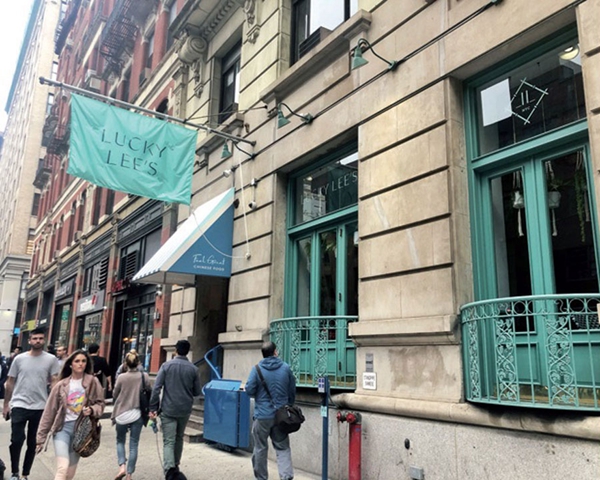'Healthy' NYC Chinese restaurant receives mouthful on social media
 0 Comment(s)
0 Comment(s) Print
Print E-mail China Daily, April 16, 2019
E-mail China Daily, April 16, 2019

A newly opened Chinese restaurant in Manhattan found itself in a social media controversy after its owner promoted the cuisine as healthier than your typical Chinese restaurant.
In an effort to offer "feel-great food inspired by American-Chinese cuisine", the restaurant Lucky Lee's, owned by New York-based nutritionist Arielle Haspel, was criticized for since-deleted Instagram posts that favorably compared its cuisine to lo mein as "not too oily or salty", which won't make diners "feel bloated and icky the next day".
The restaurant, which opened on April 8 and is located near New York University, branded its food as "clean", a concept Haspel has long promoted in her health blogs and food videos, which she explained as "all about finding a healthier alternative to your favorite indulgent food".
The descriptions produced an internet backlash, especially from the Chinese-American community, who saw the analogies as disrespectful and stereotypical.
New York-based food writer MacKenzie Fegan, whose family runs an established San Francisco-based Chinese restaurant chain called Henry's Hunan Restaurant, tweeted that while there's nothing wrong with opening a "gluten-free, dairy-free" Chinese restaurant, the owner should "do it without dragging an entire, diverse cuisine representing billions of people".
Another Twitter user, Kevin Huang, wrote that "if you are going to take up a cultural group's food, do it some justice by not marketing your 'differentiation' with language that further reinforces stereotypes/ racist perceptions".
The fact that the owners are non-Chinese has complicated the contretemps, with some questioning the couple's use of Lee, a common Chinese surname that happens to be the first name of Haspel's husband.
It could "trick people into thinking this food is somehow created by a Chinese person", wrote Twitter user Victoria Kwan.
The outcry led to review website Yelp placing an "unusual activity alert" on the business and temporarily disabling postings to the restaurant's page.
The restaurant responded in an Instagram post on April 9, acknowledging "there are cultural sensitivities related to our Lucky Lee's concept".
Chinese-American food was a "big and very happy part" of the couple's childhoods, they said, and Lucky Lee's is an example of two cultures — Chinese and Jewish — coming together in "the ultimate melting pot" of New York, they wrote in the post.
The post drew mixed responses, with some defending the restaurant and others demanding an apology.
Haspel told China Daily on Sunday that she and her husband are working on a statement of apology.
"We were never trying to do something against the community. We thought we were complementing an incredibly important cuisine, in a way that would cater to people that had certain dietary requirements," she said in a previous interview with The New York Times. "We have been listening and learning, and we have been making changes and we will continue. Shame on us for not being smarter about cultural sensitivities."
On Sunday, the restaurant was busy at lunchtime, with people waiting on line.
A New York couple who talked to China Daily on condition of anonymity said they decided to check out the place after hearing about the controversy.
"The food is good," they said, while acknowledging it would not be their destination if they were looking for "more authentic Chinese food".
"They are more like Panda Express," a restaurant chain that says it "defines American Chinese cuisine", but better and healthier, the couple said.
Lucky Lee's states that "this entire menu is gluten-free, dairy-free, wheat-free, corn-free, peanut cashew & pistachio-free. Ingredients may be made in facilities that process gluten, dairy, wheat, nuts. We use non-GMO oil & never refined sugar, MSG or food coloring."
Another New Yorker who lives a few blocks from the restaurant, who declined to share his name, said the place seems like a good fit for the neighborhood in vibe and atmosphere.
He said he hardly saw any customers who seemed to be from the Chinese-American community while waiting for his takeout order.
Grant Lee, a New York University student who went in the restaurant to take a look, said "the cross-cultural experience is not a bad thing. That's how the culture goes; people take it different ways," he said, allowing that as someone connected to Chinese culture, he understands that Americans may have a different take on Asian cuisine.
"I just hope that everyone knows and understands that the difference is there. They should not look down on different types of cultures," he said.





